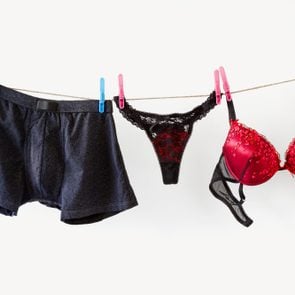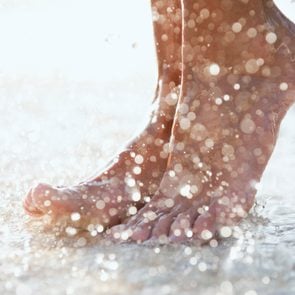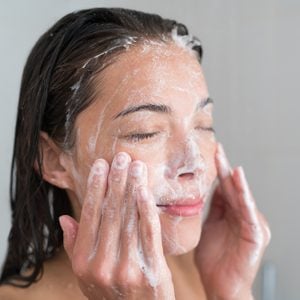The Scary Reasons You Should Never Go to Bed with Wet Hair
Updated: Jan. 19, 2024
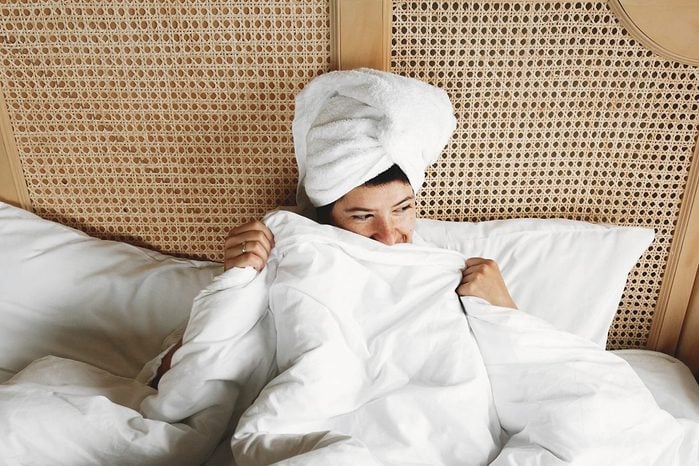
Is it bad to sleep with wet hair? Here's what the experts say about this nighttime habit that can cause problems for your hair, skin and health.
Showering at night has a host of benefits, including cleansing your body of allergens, oils and sweat from the day and promoting relaxation. In fact, warmth is known to ease stress and tension, and many studies have found that taking a warm bath or shower before bedtime improves sleep quality. But what about your post-shower routine? You’ve washed your hair with the best shampoo, exfoliated your body, completed your skin-care regimen and even washed your bedding. But drying your hair sounds like a chore. So, is it bad to sleep with wet hair? It’s very tempting to cut corners here so you can get on with your night, but there are some very good reasons you should reconsider hitting the hay with a wet head.
Get Reader’s Digest’s Read Up newsletter for more beauty, humor, cleaning, travel, tech and fun facts all week long.
Is it bad to sleep with wet hair?
According to Dendy Engelman, MD, a board-certified dermatologist in New York City, laying your wet hair on a pillow increases the risk for bacterial and fungal growth. Not only is that bad for your hair and skin, but it can also increase your chances of getting and spreading various infections.
“Sleeping with wet hair creates a warm and damp environment that is optimal for bacteria to thrive and grow in, which can lead to other scalp and skin infections,” Dr. Engelman says. For that reason, she highly advises against ever going to bed with wet hair.
What scary things can happen when you sleep with wet hair?
If you’re asking if it’s bad to sleep with wet hair, there’s a lot to unpack, as this habit can pose a host of risks to your skin, hair and overall health—and will certainly require you to wash your pillowcases more often. Here are some of the things that can happen if you aren’t careful.
Bacteria can build up on your scalp
According to Dr. Engelman, laying your head on a pillow with wet hair makes it easier for bacteria to accumulate on your scalp. “Because the hair is damp and pressed against the pillowcase, the scalp is unable to breathe,” she says. “Wet hair against a pillow will always be a risk for bacteria and fungal growth.”
Not only is that generally gross for you and anyone you share a bed with, but it also increases the chance of spreading bacterial infections.
Your bedding can get moldy
When bacteria accumulates on your scalp, it can easily transfer to your bedding. And just like with wet towels, if damp pillowcases and bedding aren’t positioned to dry properly, they can easily become breeding grounds for mold. That’s gross to see and smell, and according to the Centers for Disease Control and Prevention, unhealthy to breathe in as well. Exposure to mold might have you waking up with a stuffy nose, red or itchy eyes, headaches or trouble breathing.
Your scalp can get irritated
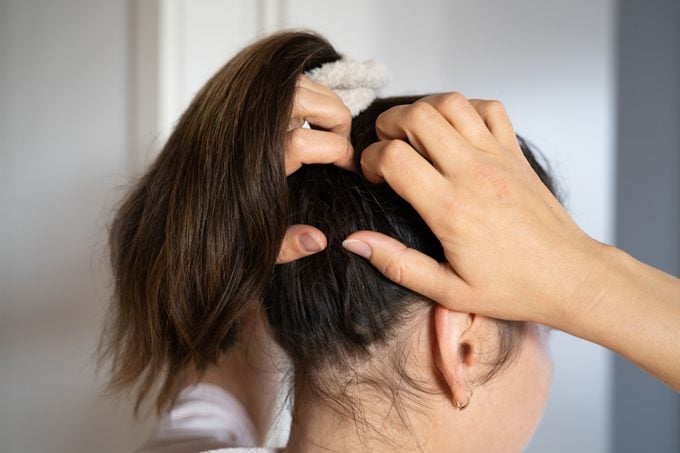
If bacteria is able to accumulate on your scalp, it can lead to infections at the root of your hair, says Dr. Engelman. When wet hair is pressed and piled up on a pillowcase, it’s unable to breathe, she says. That means you might end up with overactive sebaceous glands, which can cause seborrheic dermatitis; symptoms include dandruff, irritation, itchiness and inflamed patches.
“Malassezia yeast, which causes seborrheic dermatitis or dandruff, can also proliferate in warm, moist, dark environments—like wet hair when sleeping,” she adds. Yeast growth can sometimes lead to infection, which could require over-the-counter treatment shampoo or even prescription medication to clear things up.
You can get fungal or bacterial infections
“Bacterial or fungal folliculitis are common infections you may run into when sleeping with wet hair,” Dr. Engelman says. “These conditions cause the hair follicle to become inflamed, leading to irritation, redness and acne bumps on the scalp.”
And if you share your bed with a partner, you’re not doing them any favors. Between tossing, turning and general movement, accumulated bacteria is able to move more freely. Direct contact can spread bacterial or fungal folliculitis infections to others as well, Dr. Engelman explains. In addition to bedding, you also shouldn’t share towels or razors with others if you know you’re contagious.
You might break out
For many adults, acne isn’t just an adolescent problem. Even if you wash your face every night (and know what happens if you don’t wash your face), you won’t be in the clear if your pillowcase has previous bacteria buildup. As you toss and turn throughout the night, bacteria found on pillowcases can cause skin irritation and acne as well. (This is also why you should wash your bras more often.) “Any skin contact, such as sleeping on your side with your cheek against a contaminated pillowcase, can potentially cause fungal acne breakouts,” Dr. Engelman notes.
How often should you wash your pillowcase?
Wondering just how dirty unwashed pillowcases can get? It’s not good. Even if you don’t go to bed with wet hair, bacteria, sweat and dead skin cells all build up on your bedding. According to the Cleveland Clinic, you should wash your bedding twice a week, but many experts suggest at least once a week to prevent skin breakouts and to avoid exacerbating conditions, such as allergies and asthma.
Always check your bedding’s laundry symbols for special instructions, but a good rule of thumb is to machine-wash it with hot water. Experts also suggest washing your pillows every three to six months if they’re washable. If you regularly sleep with wet hair, you’ll want to do this more often due to potential bacterial growth.
What else can happen to your hair if you don’t dry it before bed?
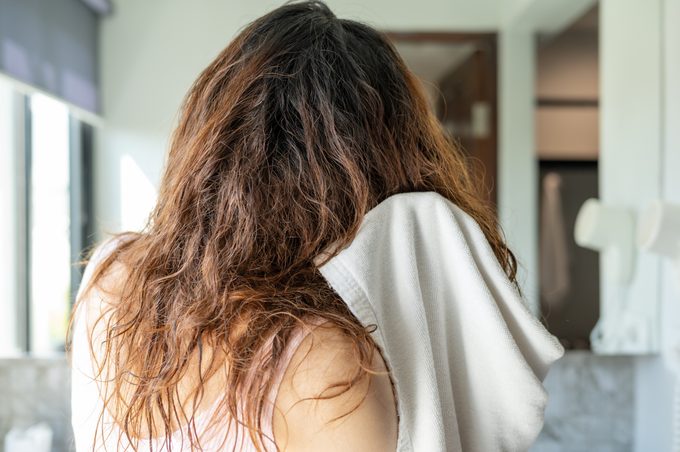
If you’ve asked yourself, “Is it bad to sleep with wet hair?” because you’re concerned about damaging your locks, we have some unfortunate news. “Hair is made up of proteins known as keratin, and when the hair becomes wet, the keratin forms weaker hydrogen bonds that stretch, making it more susceptible to damage,” Dr. Engelman says. “When the hair is in this weakened state, sleeping with wet hair can cause breakage due to the friction against your head to the pillow.” Here’s what we know:
You might see hair breakage
When hair is wet, it is at its most fragile state, says Katelyn Ellsworth, a hairstylist and founder of the Roslyn Salon in San Diego. Even if you’ve made an effort to brush out tangles, going to bed with wet hair is one of the worst things you can do for your hair, especially if it’s already prone to damage.
You could ruin your hair extensions
Whether you have clip-in, tape-in or sew-in hair extensions, you’ve invested your money in luscious locks, but going to bed with wet hair extensions means paying a high price in the morning. A leading cause of hair-extension damage, matting and tangling at the root can cause bonds to clump together, making them more challenging to care for and remove.
And that’s not all. When wet hair extensions get tangled, this can also damage your natural hair, says Dr. Engelman. Drying your hair thoroughly before going to bed will prevent these issues.
How can you minimize problems if you like to shower at night?
If you prefer to shower at night, take steps to avoid going to bed with a sopping wet head. First, know how often you should wash your hair—and make sure you’re not overwashing. This can vary based on texture and type, but there’s a good chance you don’t need to be lathering up every night. If it is a wash day, Dr. Engelman recommends washing your hair as early as you can.
Then, towel-dry your hair, focusing on the roots, with a microfiber towel, which will reduce friction and wick away moisture faster than a cotton towel. Another option is to blow-dry your hair. Dry it until it’s about 80% to 90% dry, Ellsworth says. Her hairstylist tip for next-day hair? Further protect your strands by conditioning well and sleeping on a satin pillowcase.
“You could also do your wash and style in the morning and just shower [without wetting your hair] at night,” Ellsworth adds.
Overall, experts agree that going to bed with soaking-wet or even damp hair is not healthy or safe for your hair and overall physical well-being. But if evening showering is your preference, alter your routine a bit to reduce your risk of potential infections and hair damage.
About the experts
- Dendy Engelman, MD, is a board-certified dermatologist in New York City. She is also the director of dermatologic surgery at Metropolitan Hospital.
- Katelyn Ellsworth is the founder of the Roslyn Salon in San Diego. She specializes in natural-looking color and extensions.
Sources:
- Centers for Disease Control and Prevention: “Basic facts about mold and dampness”
- Cleveland Clinic: “How Often You Should Wash Your Sheets (and the Gross Reasons Why)”
- Sleep Medicine Review: “Before-bedtime passive body heating by warm shower or bath to improve sleep: A systematic review and meta-analysis”

